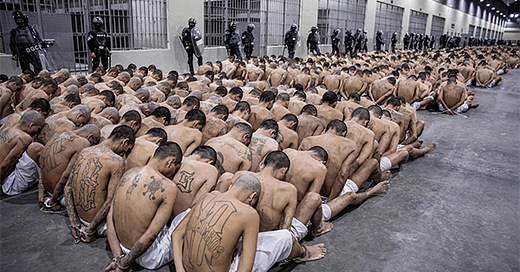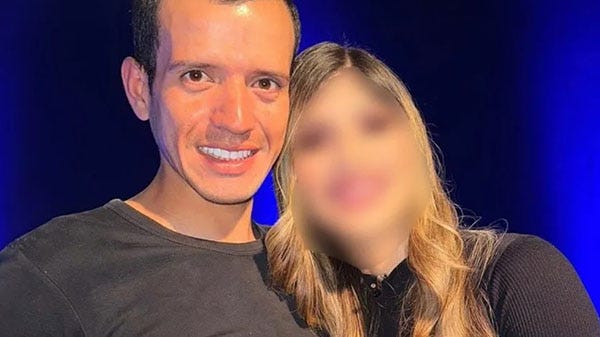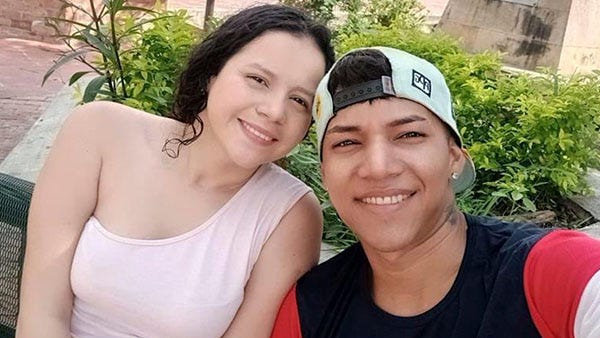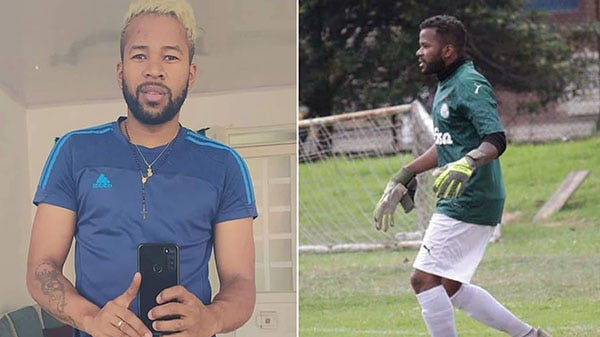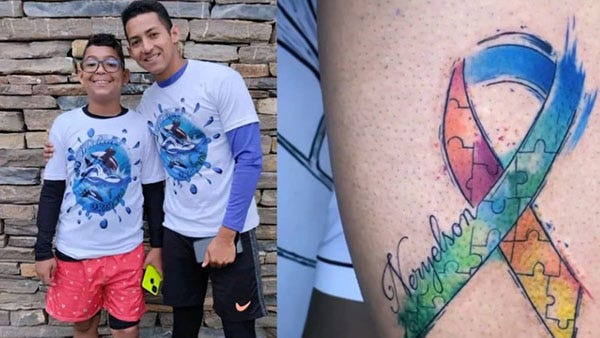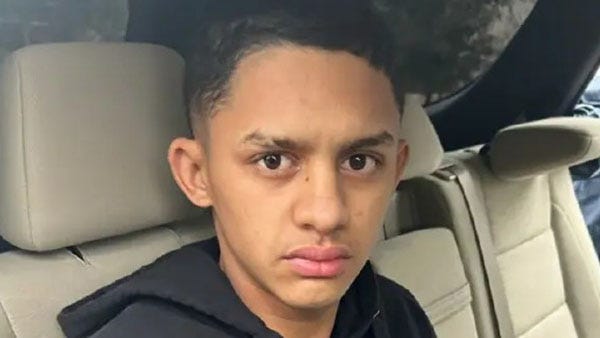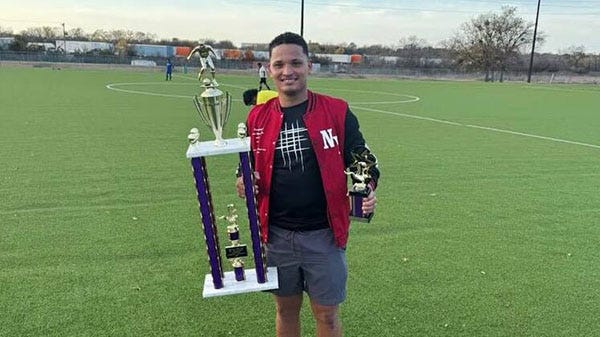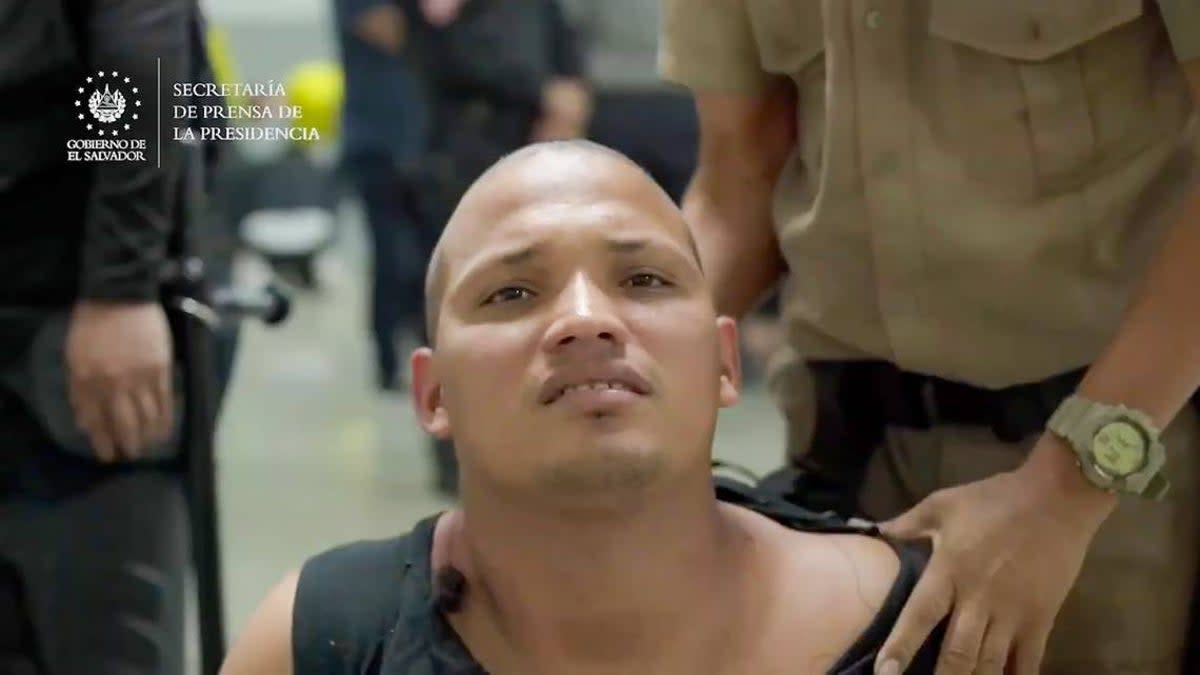Six Lives, One Hell on Earth: How the U.S. Disappeared Regular, Nonviolent Men
They were barbers, bakers, students, and sons. This is what happens when we give up on due process.
The United States has begun deporting people to one of the most brutal prisons in the world.
Not after trials. Not after convictions. But based on suspicion. Tattoos. Fear.
Hundreds of Venezuelan men have been sent to CECOT, a mega-prison in El Salvador known for its harsh conditions and public displays of punishment. Many of them were never charged with a crime. Some were here legally. Some were seeking asylum. Most were deported without ever seeing a judge.
This is not a question of immigration policy.
This is a question of basic human rights.
This is a question about whether we are still the country that believes in life, liberty, and the pursuit of happiness.
Here are six of them. Six non-gang members, non-violent offenders whose wives, children, friends, brothers, and families will probably never see again because the White House wanted to put on a show, and no one would stop them.
Andry Hernández
Andry Hernández is not a gang member.
He’s 31 years old and a makeup artist. He fled Venezuela because being gay there put him in danger. He came to the U.S. looking for safety and freedom. In Los Angeles, he found work, community, and a chance to live openly as himself. He was waiting on his asylum case - doing everything right.
But none of that mattered when the U.S. government decided to make an example out of someone.
Andry was taken without warning. No hearing. No lawyer. Just a cold decision based on a lie. Officials said he had gang ties. They gave no proof. They didn’t ask questions. They put him on a plane to El Salvador.
Now, he was inside one of the most brutal prisons in the world - El Salvador’s “Terrorism Confinement Center,” or CECOT.
He didn’t scream. Not at first.
When a guard shoved him to the ground, he started crying. When another guard grabbed him and began shaving his head, Franco folded his hands together like he was praying. His fingers trembled. His lips moved quietly, whispering to someone who wasn’t there.
That’s when he broke.
“I’m not a gang member,” he sobbed. “I’m gay. I’m a barber.”
He begged for his mother.
A photographer from TIME was there and saw it all. He wrote: “He began to whimper… folding his hands in prayer as his hair fell… asked for his mother and cried as he was slapped again.”
This wasn’t justice.
This wasn’t about public safety.
This was a show.
Andry was never part of a gang. His crime was being different. His crime was looking the way he does, loving who he loves, and wearing eyeliner in a country that treats brown skin and tattoos like evidence.
The United States sent him to hell for that.
Look at his face.
And ask yourself: Do you see a threat? Or do you see someone who should have been protected?
Because at this moment - on that prison floor, head bowed, lips shaking, asking for his mother - there was no one to protect him.
Franco José Caraballo Tiapa
Franco José Caraballo Tiapa was 26 years old.
He came to the United States from Venezuela with hope and a plan. He stayed out of trouble. He had no criminal record - not even a parking ticket. He lived with his wife, Johanny Sánchez, and their daughter. He was planning her fifth birthday party.
Then, one day, he was gone.
Franco had an immigration appointment scheduled. He was walking toward it when federal agents picked him up. They didn’t accuse him of a crime. They didn’t show a warrant. They didn’t let him talk to a lawyer.
They just took him.
Within days, he was deported to El Salvador - put on a secret flight to one of the most violent prisons in the world.
Now Johanny is alone. She has no answers. No update. No phone call.
And their daughter? She keeps asking where her dad is.
“She asked where he is, that she’s been looking for him and can’t find him,” Johanny told CBS News. “Next week, she turns five. She keeps asking about her little party that her dad was planning for her.”
There will be no party.
Because Franco is no longer in the United States. He’s not even in Venezuela.
He’s inside CECOT, a prison built for ganglords and killers. A place where people are stripped, shaved, beaten, and erased. A place where no one comes back.
Franco had no gang ties. No violent past. Some believe he was targeted simply for having tattoos. One of them was the word “Tren” - a common name in Venezuela and also part of a gang name immigration agents are now scanning for like a search term.
It didn’t matter who he was. It only mattered what he looked like.
Now, his wife has only a photo.
His daughter has only questions.
And Franco - who followed every rule, who showed up when he was told, who was trying to be a father - has become a ghost.
Inside CECOT: A Place You Don’t Leave
CECOT isn’t just a prison. It’s a place where people disappear.
The walls are tall and white, with razor wire curling across the top like claws. The inside is cold and colorless.
There are no windows.
No sunlight.
Just cameras, guards, and fear.
The men inside are stripped of everything. Their clothes. Their hair. Their names.
They are marched barefoot across the concrete floor, bent at the waist, chained wrist to wrist, ankle to ankle. They are made to sit in rows, hunched and silent, like livestock in a cage. They are not allowed to speak, stand, or look up.
Every hour of every day, they are watched. If they twitch, they are punished. If they speak, they are punished. If they cry, they are punished.
This is the place where the U.S. government is sending people like Andry and Franco.
People who never got a hearing.
People who committed no crime.
People who were never meant to come back.
Because no one leaves CECOT.
There is no court date.
No lawyer.
No appeal.
Once you’re inside, you are dead to the world.
The Trump White House knows this. So does El Salvador. That’s the whole point.
This is not about justice. It’s about erasing people quietly. Deporting them into a place where no one will ask questions and no one will ever have to see them again.
The men inside CECOT are not just prisoners. They are props in a political show.
A show meant to make MAGA die-hards smile.
A show meant to look “tough.”
A show that costs real human lives.
When you look at those photos - rows of men, shaved heads, backs bent - you might think it looks like something from a war zone.
But this is happening right now. And it’s being done with our permission.
These people are not coming back.
And that’s exactly how Donald Trump wants it.
Jerce Reyes Barrios
Jerce Reyes Barrios loves soccer. And he loves his daughters.
That’s it. That’s who he is.
He doesn’t get in trouble. “Jerce doesn’t even drink, he doesn’t smoke, he’s never been involved in any crime or bad situation! The only things he cares about are his daughters and soccer,” said his partner, Mariyin Araujo, from southern Mexico. She had come there with their girls, hoping to join Jerce in the United States.
But she never got the chance.
Because Jerce is gone.
He was picked up in the U.S. by immigration agents. The reason? A tattoo on his arm: the crest of Real Madrid, one of the most famous soccer teams in the world. But ICE agents said it looked like a gang tattoo. They didn’t ask what it meant. They didn’t investigate. They didn’t bring him before a judge.
They just decided.
And Jerce was deported.
Now, he’s locked in El Salvador’s CECOT prison - chained to the floor, shaved, surrounded by men accused of murder and torture. All for a soccer logo.
There was no evidence against him. No record. No warning. Just a tattoo and a system that doesn’t care if it gets it wrong - as long as it looks tough doing it.
Jerce was never a threat.
He was a dad trying to build a future.
He worked, saved, waited. He had already sacrificed time with his family to help them escape Venezuela’s collapse. His daughters - young, scared, clinging to their mother - thought they were getting closer to him.
Now they don’t know when they’ll see him again. Or if they will.
Because CECOT isn’t a place you leave. It’s a place built to make people disappear.
And now Jerce - a man who only cared about his family and the game he loved - has vanished into it.
All because someone looked at his arm and saw something he wasn’t.
Neri Alvarado
This is Neri Alvarado, a baker from Dallas.
He’s 25 years old. In the photo, he’s standing next to his little brother, Nelyerson, who is 15 and lives with autism. Neri adores him. He used to teach swimming lessons to children with developmental disabilities, just like his brother. He didn’t do it for money or recognition. He did it because he cared.
To show that love, he got a tattoo - a ribbon for autism awareness, inked onto his skin. A symbol of pride, not violence. A tribute, not a threat.
But to the U.S. government, it became a reason to deport him.
Two months ago, immigration agents showed up at Neri’s apartment in Texas. They were checking people with tattoos. Neri was honest. He told them what the tattoo meant. He even showed them his phone. An agent reviewed everything and told him, “I’m going to put down here that you have nothing to do with Tren de Aragua.”
In other words: You’re cleared. You’re good to go.
Then something changed.
An ICE office in Dallas held Neri anyway, without telling him why. He thought maybe he’d be sent back to Venezuela. But he never arrived.
His family waited. Days passed. No word.
Then, they saw it.
Neri’s name appeared on a list of deportees sent to El Salvador. Not just anywhere - but to CECOT, one of the most violent prisons in the world.
A prison built to terrify. To erase.
No hearing. No court. No explanation. Neri was disappeared by a government that decided a tattoo was enough.
His sister, María, told reporters: “Anyone who’s talked to Neri for even an hour can tell you what a great person he is… He’s someone who, as they say, wouldn’t even hurt a fly.”
Take a good look again at that photo. You can just tell, this is a good guy.
His friends from the Orcirus Club, where he helped with neurodiversity therapy, are begging for his release. His brother John made a video, asking for Neri’s freedom, saying: “He is a very honest boy… He was my daughter’s teacher. An excellent, respectful person. He does not deserve to be in that place.”
But there is no answer. No path home.
Today, Neri is suffering inside CECOT - chained, shaved, silenced. For a ribbon. For love.
This is not a policy.
This is cruelty with a flag on it.
This is what happens when compassion gets punished and silence gets rewarded.
This is what happens when a government decides that kindness looks suspicious.
And now a brother waits. A sister cries. A family watches every headline, hoping that someone, somewhere, still cares.
Carlos Daniel Terán
Carlos Daniel Terán was just a kid.
He wasn’t in a gang. He wasn’t violent. He wasn’t tough. He was soft-spoken, anxious, and scared. That’s what his family remembers most - that scared look on his face when he got caught up in something far bigger than he understood.
Carlos came to the United States from Venezuela like so many others - hoping for a better future. But he never got the chance to build one.
He was picked up by immigration officials and labeled a gang member without proof. Not because of anything he did. Not because of anything anyone saw. Just a quiet note in a file. A guess.
No one spent even a second checking to see if it was true.
His family was shocked. They said Carlos wouldn’t even know how to join a gang if he tried. “He’s just a simple kid,” they said. Nervous. Gentle. He barely even spoke up for himself, let alone posed a threat.
But it didn’t matter.
Under the Alien Enemies Act, no trial was needed. No lawyer. No hearing. Just suspicion.
And then he was gone.
Now Carlos is believed to be inside CECOT - the massive prison in El Salvador where people are shackled, shaved, beaten, and forgotten. A place for criminals. For killers. For monsters.
But Carlos isn’t any of those things.
He’s just a boy who never stood a chance.
The government didn’t just make a mistake. They didn’t even care enough to ask if it was a mistake.
They saw a scared kid - and they threw him away.
Mervin José Yamarte Fernández
We don’t have to wonder what happened to Mervin José Yamarte Fernández.
We’ve seen the photo:
His head is shaved. His face pulled tight. His body yanked backward by guards who posed him like a prize. He’s inside CECOT, the El Salvador mega-prison known around the world for its cruelty.
This isn’t a guess. It’s not a rumor.
He’s there.
His wife and 4-year old daughter recognized him immediately. They then knew.
One day, the government decided he fit the profile. That was all it took.
Mervin had no criminal record.
No violent past.
He wasn’t on any gang list.
He was a Venezuelan man living in the United States - quietly, peacefully. He came here solely to support his wife and daughter.
He was picked up without warning. Deported without a trial. Sent not to his home country, but to a prison made to destroy people.
His family didn’t even know where he was until they saw his name on a list.
Then they saw his face.
A still image. Head bent. Shoulders hunched. A man stripped of his story and turned into a symbol.
For what?
He wasn’t a threat. He wasn’t a criminal. But under the Alien Enemies Act, no one needed to prove anything. Just suspicion. Just silence. Just enough fear to get him on the plane.
Now he’s one of the many locked inside CECOT - a place designed not for justice, but for spectacle.
Mervin’s story is no longer a warning. It’s a reality.
This is what happens when no one stands up.
When men like Mervin - kind, innocent, undocumented but not dangerous - are turned into political props.
We know where he is.
And that’s exactly what makes it so horrifying.
The Alien Enemies Act: A Law for War, Abused for a Lie
There is no war (for there to be a war, Congress must issue a Declaration of War). There is no invasion (an invasion means an incursion by a mass of armed soldiers crossing the border together with the intent to attack the country itself). But the Trump administration is using a 226-year-old law as if there is.
It’s called the Alien Enemies Act. It was passed in 1798. Back then, it was meant for times of war. If America was being attacked by another country, the president could detain or remove people from that enemy nation - but only with limits.
The law says this clearly:
It only applies during a declared war or an actual invasion. There is no invasion now - no army, no enemy flag, no declaration of war.
It says people must be given “reasonable time” to leave the country voluntarily.
And it says anyone detained under the Act must be treated according to the Constitution and given due process.
But that’s not what’s happening.
In March, the Trump White House issued a public order calling the Venezuelan gang Tren de Aragua an invading force. They claimed this gang was part of an "ongoing invasion" of the United States and used that claim to activate the Alien Enemies Act.
But there is no invasion. There is no war. There is no legal basis for this. That’s not just opinion - it’s the judgment of constitutional scholars, civil rights groups, and legal experts. Using this law to mass-deport immigrants is illegal and dangerous.
And even if the law did apply, it requires due process. But these men - Andry, Franco, Jerce, Neri, Carlos, Mervin - were given none. No hearings. No lawyers. No chance to leave on their own. Just orders, flights, and prison cells.
This isn’t national defense. It’s political theater wrapped in legal lies.
The Alien Enemies Act is not a blank check. It is not a weapon for mass removal. And it was never meant to be used like this.
But under Trump, it’s become exactly that: a tool to disappear people quickly, without the burden of proof or the bother of truth.
Due Process: The Right Everyone Is Supposed to Have
In the United States, before the government takes away your freedom, you’re supposed to get a chance to defend yourself.
That’s not about being “nice.” It’s about being a country where the law means something.
It’s called due process, and it’s written into the Constitution. It means you get to know what you’re being accused of. You get to see the evidence. You get to speak. You get a hearing. A lawyer. A fair shot.
That’s how we’re supposed to make sure the government doesn’t punish the wrong person.
But in these deportations, none of that happened.
People were picked up, labeled as gang members, and deported without a trial. No questions. No evidence. No defense.
Franco was walking to his immigration appointment.
An ICE agent told Neri he was “clean.”
Jerce had a tattoo of a soccer team.
Carlos was scared and quiet, and no one even bothered to check if he was in a gang.
No one looked. No one listened. No one cared.
That’s what due process is for. It’s not some luxury we give to people we like. It’s a guardrail. It’s what stops the government from making mistakes - or worse, from abusing its power on purpose.
Because once due process is gone, it’s not just about them anymore.
It could be you.
You could be the one with a tattoo that gets misread. Or a name that gets flagged. Or a background that someone doesn’t understand.
And once you’re on that list, it’s too late.
You are a citizen, you say?
No one is checking twice.
They’ll put you on a plane. They’ll send you to CECOT. And no one will ask if they got it wrong until you’re already shaved, chained, and gone.
That’s why this matters.
Due process doesn’t exist to protect criminals. It exists to protect the innocent.
And right now, it’s being erased.
Cruel and Unusual: When We Know What We’re Doing - and Do It Anyway
The Eighth Amendment of the U.S. Constitution is supposed to protect everyone from cruelty. It says clearly:
“Excessive bail shall not be required, nor excessive fines imposed, nor cruel and unusual punishments inflicted.”
That line was written in 1791. It was meant to apply to anyone the U.S. government touches.
And it still applies today.
So here’s the question: What do you call it when the U.S. government knowingly sends people into a prison that breaks them - body and soul?
Because that’s exactly what happens inside CECOT.
CECOT is not a prison built for justice. It is a stage for punishment. Thousands of men - many of them never charged or convicted - are crammed into overcrowded cells. They are shaved bald. They are chained together, bent at the waist for hours. They sleep on the floor. They are denied sunlight, legal contact, and medical care. They are beaten. They are starved. They are silenced.
We have photos. We have videos. We know.
And yet the Trump administration is sending people there - people who were never tried, never convicted, and in many cases, never even accused of anything real.
Legal scholars and human rights organizations have said it plainly: this is cruel and unusual punishment by proxy. The U.S. may not be running CECOT, but it is knowingly funneling people into it, fully aware of what awaits them inside.
That is a violation of the Constitution.
We do not get to export our cruelty just because we don’t want to see it up close.
And these aren’t dangerous criminals.
These are people like Neri, who taught kids with autism to swim.
Like Franco, who was walking to an immigration appointment.
Like Jerce, who loved soccer and his daughters.
This isn’t national security. It’s vengeance without a crime.
The 8th Amendment is supposed to draw a line.
What happens at CECOT crosses it.
And we are the ones sending them there.
This Isn’t a Solution, It’s a Distraction
If the goal was to fix immigration, this isn’t it.
The U.S. immigration system is in chaos. Courts are overloaded. The border is strained. People are waiting years just to have their asylum cases heard. Nothing is moving the way it should.
Now, President Trump is trying to make it look like he’s “cracking down.” But it’s not working. It’s not even real.
A recent report by Newsweek shows just how bad things really are. Despite all the tough talk, deportation numbers are low. ICE doesn’t have the staff, the space, or the legal backing to actually carry out the kind of mass removals Trump promised. Even with all the noise, the machinery is breaking down.
So, what does the administration do instead?
They put on a show.
They grab people with tattoos or old records. People who look “suspicious.” They skip the courts. They use old wartime laws to push them out the door. And they send them to foreign prisons where no one ever gets out.
It doesn’t fix anything.
It doesn’t stop border crossings.
It doesn’t make anyone safer.
It just turns pain into a performance.
This isn’t immigration policy. It’s a cover-up.
A desperate distraction from a broken system - using human lives as props.
What Kind of Country Are We Becoming?
Andry Hernández is not coming back.
Neither is Franco.
Or Jerce. Or Neri. Or Carlos. Or Mervin.
They’ve been disappeared - sent to a prison built to make people vanish. No charges. No trials. No way back.
Most Americans want strong borders. Most Americans want real immigration policy. Nearly all of us agree: actual gang members don’t belong here.
But we have to be sure they are gang members. That’s not a small thing. That’s everything.
Due process isn’t about being nice. It’s about being right.
It’s the line that keeps them from picking you up by mistake. It’s the difference between law and power. And once we give it up, we don’t get it back.
I’m not too concerned about the few who’ve landed in CECOT who are real killers. I don’t love the conditions - but sadly, too many things are going wrong to make it a top 10 issue for me.
This article is not about them.
It’s about:
Andry, who was here legally - and now whimpers on a prison floor, asking for his mother.
Franco, a husband and father seeking a better life. Maybe he should’ve been deported - but to hell? Never.
Jerce, a professional soccer player, sent into torture because he loved Real Madrid.
Neri, a gentle baker, punished for an Autism Awareness tattoo he got to honor his little brother.
Carlos, a quiet, shy teenager, tossed into a cage of killers without a second thought.
Mervin, another baker, another father, who had done everything right - and was sent, not home, but into a concrete abyss.
This is cruelty. And we cannot be a country built on cruelty.
We tell ourselves we’re different - that we follow the law, that we value fairness, that we protect the innocent. That’s what makes America worth believing in.
But when we throw those values away just to look tough, we don’t scare the world.
We dishonor ourselves.
We must not become a nation where fear beats fairness. Where silence replaces justice. Where people disappear, and no one cares why.
We can’t fix immigration by destroying the rule of law.
And we won’t stay a great country if we stop acting like one.


